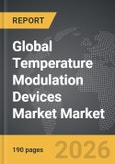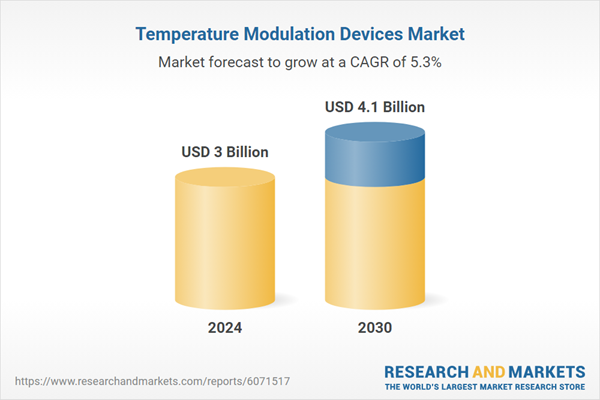Global Temperature Modulation Devices Market - Key Trends & Drivers Summarized
Is Precision Temperature Control Becoming a Cornerstone of Modern Therapeutics?
Temperature modulation devices are gaining critical prominence in both surgical and non-surgical healthcare settings, driven by their ability to precisely regulate patient body temperature in a range of clinical scenarios. These devices are designed to induce hypothermia, prevent hyperthermia, or maintain normothermia, depending on the therapeutic goal, and they play an essential role in improving patient outcomes in areas such as cardiac arrest recovery, stroke management, traumatic brain injury (TBI), and perioperative care. As the clinical evidence supporting therapeutic temperature modulation continues to strengthen, hospitals and critical care units are increasingly adopting advanced systems capable of invasive and non-invasive temperature management. Modern devices utilize surface cooling pads, intravascular catheters, or hybrid systems to deliver targeted temperature control, often integrated with automated feedback loops for enhanced precision. The rise in surgical procedures - particularly those involving long anesthesia durations or cardiovascular risk - has further fueled demand for normothermia-maintaining systems to reduce post-operative complications. Guidelines from bodies like the American Heart Association and the European Resuscitation Council have reinforced the importance of temperature modulation in post-cardiac arrest protocols, giving a regulatory boost to market adoption. Additionally, neonatal intensive care units (NICUs) and emergency departments are adopting these technologies to improve neuroprotection and survival rates, underscoring the expanding breadth of clinical application.Why Are Critical Care Settings Increasing Reliance on Thermal Regulation Technologies?
Temperature modulation devices are becoming increasingly central to protocols in intensive care units (ICUs) and emergency departments, as precise thermal control is now considered a vital parameter in critical care. In patients suffering from neurological injuries - such as stroke or hypoxic-ischemic encephalopathy - cooling therapies have demonstrated a measurable reduction in inflammation, cerebral edema, and secondary brain injury. Similarly, febrile management in septic patients is now recognized as a modifiable determinant of morbidity and mortality, leading to the widespread deployment of surface and endovascular cooling devices. Burn care units use these technologies to maintain stable core temperatures during prolonged debridement and grafting procedures, while organ transplant programs rely on temperature control to optimize tissue viability pre- and post-surgery. Pediatric and geriatric populations, particularly vulnerable to temperature dysregulation, are also benefitting from tailored thermal management solutions. As healthcare providers place greater emphasis on personalized, evidence-based care, the ability to tightly control body temperature has become a therapeutic advantage rather than just a supportive measure. Interdisciplinary care teams - including anesthesiologists, intensivists, and neurologists - are increasingly integrating temperature modulation protocols into routine workflows, driving broader acceptance and institutional investment. Moreover, advancements in device usability, such as touch-screen interfaces and automated alert systems, are reducing the burden on healthcare staff and improving compliance with temperature targets.Can Emerging Technologies Push the Boundaries of Therapeutic Cooling and Warming?
Technology is playing a transformative role in reshaping the landscape of temperature modulation, expanding its applicability and effectiveness across more clinical domains. Next-generation temperature modulation devices are now equipped with AI-powered algorithms that predict and maintain optimal body temperature ranges based on patient vitals and response patterns. Wireless and portable systems are being introduced to support temperature management in pre-hospital settings such as ambulances and military field operations, where time-sensitive interventions are critical. Intravascular cooling catheters with enhanced biocompatibility and precision flow control are reducing complications and enabling faster temperature achievement and maintenance in acute care scenarios. Some devices now come with cloud-based data logging capabilities that allow real-time remote monitoring by specialists, facilitating continuous oversight in complex cases. Surface-based systems are also evolving, featuring advanced hydrogel pads, phase-change materials, and closed-loop fluid circulation for more uniform and efficient heat exchange. Additionally, integration with hospital electronic health records (EHRs) enables streamlined documentation and performance tracking, improving accountability and outcomes. In surgical applications, modular temperature control systems are being embedded directly into operating tables and anesthesia carts to allow seamless thermal support throughout procedures. These innovations are pushing the clinical boundaries of what temperature modulation devices can achieve, expanding their use cases into oncology (for hyperthermia therapy), sports medicine (for localized cooling), and even consumer wellness.What Specific Trends Are Fueling the Growth of the Temperature Modulation Devices Market?
The growth in the temperature modulation devices market is driven by several factors that align with technological advancement, clinical demand, and evolving healthcare practices. A key driver is the increasing prevalence of neurological and cardiovascular conditions that require acute temperature management as part of standard care - particularly stroke, cardiac arrest, and TBI. The rise in surgical volume worldwide, especially in orthopedics, cardiology, and oncology, is also creating a sustained demand for perioperative temperature control to prevent complications like hypothermia-induced coagulopathy or infection. Hospitals are investing in these devices as part of broader initiatives to improve outcomes in intensive and post-anesthesia care units. Technological innovation is playing a crucial role as well, with compact, energy-efficient, and user-friendly systems that appeal to both high-end tertiary hospitals and mid-size facilities. Increasing awareness and training around neuroprotective strategies are prompting healthcare providers to integrate temperature modulation into routine critical care protocols. Regulatory endorsements, combined with favorable reimbursement policies in regions such as North America and Western Europe, are further propelling institutional adoption. Additionally, the expansion of temperature modulation into non-traditional environments - like ambulatory surgery centers, EMS units, and rehabilitation clinics - is widening the customer base. Strategic collaborations between device manufacturers and health systems for bundled solutions, along with growing demand from military and disaster response agencies, are introducing new revenue channels. As healthcare continues to shift toward proactive, protocol-based care models, the precision and adaptability of temperature modulation devices are making them indispensable tools in the modern clinical arsenal.Report Scope
The report analyzes the Temperature Modulation Devices market, presented in terms of market value (US$). The analysis covers the key segments and geographic regions outlined below:- Segments: Type (Portable Blood / IV fluid warmers, Conductive patient warming systems, Convective patient warming systems, Conductive patient cooling systems, Others).
- Geographic Regions/Countries: World; United States; Canada; Japan; China; Europe (France; Germany; Italy; United Kingdom; Spain; Russia; and Rest of Europe); Asia-Pacific (Australia; India; South Korea; and Rest of Asia-Pacific); Latin America (Argentina; Brazil; Mexico; and Rest of Latin America); Middle East (Iran; Israel; Saudi Arabia; United Arab Emirates; and Rest of Middle East); and Africa.
Key Insights:
- Market Growth: Understand the significant growth trajectory of the Portable Blood / IV Fluid Warmers segment, which is expected to reach US$1.8 Billion by 2030 with a CAGR of a 4.3%. The Conductive Patient Warming Systems segment is also set to grow at 5.4% CAGR over the analysis period.
- Regional Analysis: Gain insights into the U.S. market, valued at $815.5 Million in 2024, and China, forecasted to grow at an impressive 8.2% CAGR to reach $804.8 Million by 2030. Discover growth trends in other key regions, including Japan, Canada, Germany, and the Asia-Pacific.
Why You Should Buy This Report:
- Detailed Market Analysis: Access a thorough analysis of the Global Temperature Modulation Devices Market, covering all major geographic regions and market segments.
- Competitive Insights: Get an overview of the competitive landscape, including the market presence of major players across different geographies.
- Future Trends and Drivers: Understand the key trends and drivers shaping the future of the Global Temperature Modulation Devices Market.
- Actionable Insights: Benefit from actionable insights that can help you identify new revenue opportunities and make strategic business decisions.
Key Questions Answered:
- How is the Global Temperature Modulation Devices Market expected to evolve by 2030?
- What are the main drivers and restraints affecting the market?
- Which market segments will grow the most over the forecast period?
- How will market shares for different regions and segments change by 2030?
- Who are the leading players in the market, and what are their prospects?
Report Features:
- Comprehensive Market Data: Independent analysis of annual sales and market forecasts in US$ Million from 2024 to 2030.
- In-Depth Regional Analysis: Detailed insights into key markets, including the U.S., China, Japan, Canada, Europe, Asia-Pacific, Latin America, Middle East, and Africa.
- Company Profiles: Coverage of players such as Accuray Incorporated, Asensus Surgical, Inc., Becton, Dickinson and Company (BD), Brainlab AG, CMR Surgical Ltd. and more.
- Complimentary Updates: Receive free report updates for one year to keep you informed of the latest market developments.
Some of the 43 companies featured in this Temperature Modulation Devices market report include:
- 3M Company
- Asahi Kasei Corporation
- Atom Medical Corporation
- Barkey GmbH & Co. KG
- Baxter International Inc.
- Becton, Dickinson and Company (BD)
- Belmont Medical Technologies
- Cincinnati Sub-Zero Products, LLC
- Drägerwerk AG & Co. KGaA
- Ecolab Inc.
- Gentherm Incorporated
- Geratherm Medical AG
- ICU Medical, Inc.
- Kinsa Inc.
- Medtronic plc
- Mennen Medical Ltd.
- Smiths Medical (Part of ICU Medical)
- Stryker Corporation
- The Surgical Company
- ZOLL Medical Corporation
This edition integrates the latest global trade and economic shifts into comprehensive market analysis. Key updates include:
- Tariff and Trade Impact: Insights into global tariff negotiations across 180+ countries, with analysis of supply chain turbulence, sourcing disruptions, and geographic realignment. Special focus on 2025 as a pivotal year for trade tensions, including updated perspectives on the Trump-era tariffs.
- Adjusted Forecasts and Analytics: Revised global and regional market forecasts through 2030, incorporating tariff effects, economic uncertainty, and structural changes in globalization. Includes historical analysis from 2015 to 2023.
- Strategic Market Dynamics: Evaluation of revised market prospects, regional outlooks, and key economic indicators such as population and urbanization trends.
- Innovation & Technology Trends: Latest developments in product and process innovation, emerging technologies, and key industry drivers shaping the competitive landscape.
- Competitive Intelligence: Updated global market share estimates for 2025, competitive positioning of major players (Strong/Active/Niche/Trivial), and refined focus on leading global brands and core players.
- Expert Insight & Commentary: Strategic analysis from economists, trade experts, and domain specialists to contextualize market shifts and identify emerging opportunities.
Table of Contents
Companies Mentioned (Partial List)
A selection of companies mentioned in this report includes, but is not limited to:
- 3M Company
- Asahi Kasei Corporation
- Atom Medical Corporation
- Barkey GmbH & Co. KG
- Baxter International Inc.
- Becton, Dickinson and Company (BD)
- Belmont Medical Technologies
- Cincinnati Sub-Zero Products, LLC
- Drägerwerk AG & Co. KGaA
- Ecolab Inc.
- Gentherm Incorporated
- Geratherm Medical AG
- ICU Medical, Inc.
- Kinsa Inc.
- Medtronic plc
- Mennen Medical Ltd.
- Smiths Medical (Part of ICU Medical)
- Stryker Corporation
- The Surgical Company
- ZOLL Medical Corporation
Table Information
| Report Attribute | Details |
|---|---|
| No. of Pages | 190 |
| Published | February 2026 |
| Forecast Period | 2024 - 2030 |
| Estimated Market Value ( USD | $ 3 Billion |
| Forecasted Market Value ( USD | $ 4.1 Billion |
| Compound Annual Growth Rate | 5.3% |
| Regions Covered | Global |









